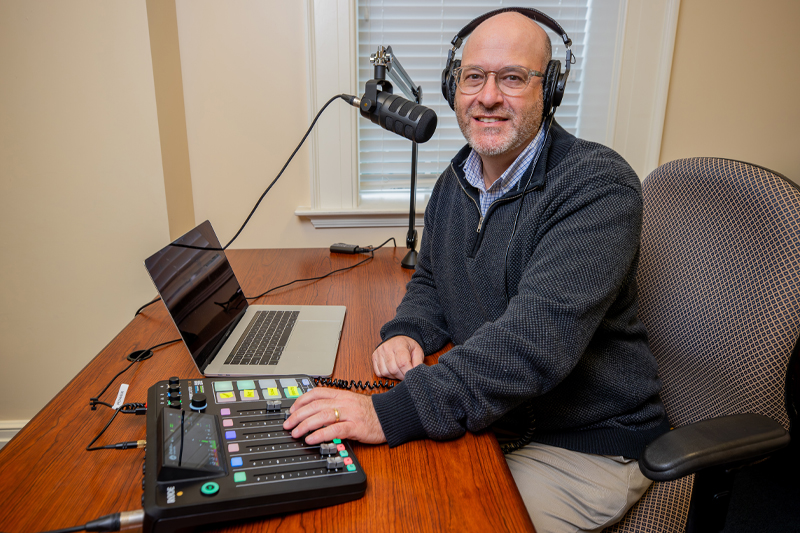
Read time:
History Professor Dr. Andrew Falk’s recently launched podcast, “Past is Prologue,” has earned the American Historical Association’s inaugural Sinclair Prize for “Most Outstanding Historical Podcast”. This remarkable recognition, given in a highly competitive field, showcases Falk’s passion for making history accessible and interconnected to today’s challenges. The podcast also enhances the University’s commitment to making scholarship more accessible by engaging with a wider audience.
“Past is Prologue” stands out for its ability to tackle a wide range of topics – from Artificial Intelligence (AI) to concepts in education – with depth, accessibility and a touch of humor. Students play an important role by assisting with research and production. The result is not just a podcast, but a collaborative, educational experience that demonstrates how historical interpretation can inform contemporary conversations.
Here’s what Professor Falk had to say about the success of the podcast, his approach to making history relevant and the collaborative process with students.
The success of your podcast seems to indicate many are seeking to deepen their understanding of current issues by exploring them through a historical lens. As an educator, what kind of value do you believe podcasts offer over traditional methods, like textbooks or academic papers, when it comes to providing these timely insights?
Traditional forms of academic scholarship continue to serve an important purpose, as does long-form print, and I personally remain active in those areas. Whether print or podcast, the work relies on research, methods of analysis applied to source material, and communicating our evidence-based interpretations.
At the same time, however, this podcast understands that there is a wider audience for public history made up of intellectually curious people who want to understand the world around them. That is why our episodes have covered topics including Artificial Intelligence, ‘divisive concepts’ in schools, and the recent presidential election. But we do so without dense theory and jargon and without an ideological axe to grind. I think listeners want to engage with ideas and weave that thought-provoking experience into their busy lives, and (if possible) with some attempt at humor. The technology allows us to respond more quickly to the day's headlines and it also allows people to listen while driving in their car, exercising, folding laundry, or cooking dinner, whether they live near or very far away.
Congratulations on being the inaugural recipient of the Sinclair Award, presented by the American Historical Association, an organization dating back to the late 1800s that is dedicated to promoting historical studies and preserving historical manuscripts to safeguard America’s history. What was your reaction when you learned your podcast was selected for this distinguished honor?
When I learned of the prize, I was speechless – which is particularly bad for a podcaster! – but also incredibly honored and grateful. The best part is that the prize recognizes the collaborative process that I have enjoyed with so many colleagues across the University: administrators who have generously supported it; audio engineers, digital media designers, and librarians who have assisted in the production; my faculty colleagues in the humanities who've lent their expertise as guests on the broadcasts; and history majors who serve as researchers.
How do you involve students in the podcast’s production or research process?
For me, the podcast is a new way to mentor students. Most episodes include a student researcher who, after we discuss the general ‘pitch’ for an episode, identifies the scholarly books and journal articles that underpin the topic and helps craft questions for our interview segments. The researchers also help sprinkle each episode with pop culture media clips – from old television programs, movie scenes, pop songs, advertisement jingles, campaign speeches – as primary sources that give ‘color’ to what we present.
Whether students are working on or simply listening to the podcast, I think it helps them understand that history is not the memorization of stale facts and trivia; instead, history is a matter of interpretation that can help us understand our present circumstances.
What are your future plans for the podcast? Are there new directions or topics you’re particularly excited to explore?
New topics present themselves on a daily basis, so I look forward to collaborating with more colleagues in different disciplines across the humanities. We have an amazing faculty at CNU, and the podcast is one way to showcase that beyond the classroom space. It's hard to predict what tomorrow's headlines will be, but I pay close attention to the news. While I can’t see into the future, I do know for sure that the past will inform it and that there is a backstory to everything.